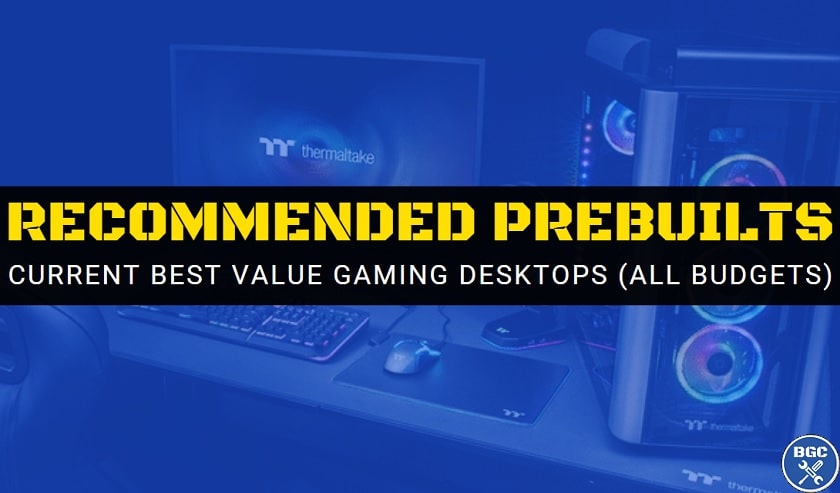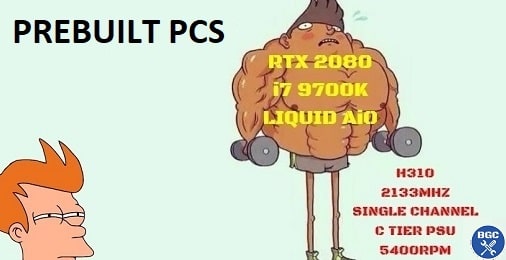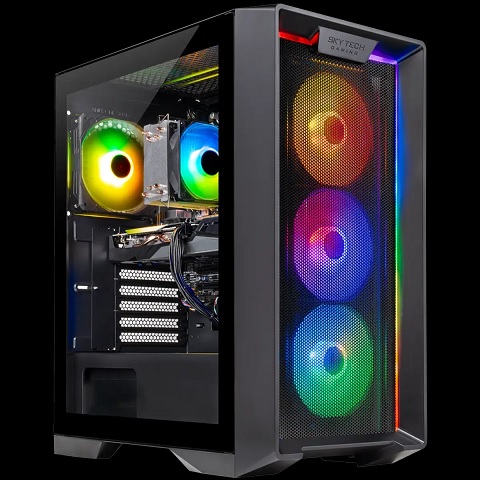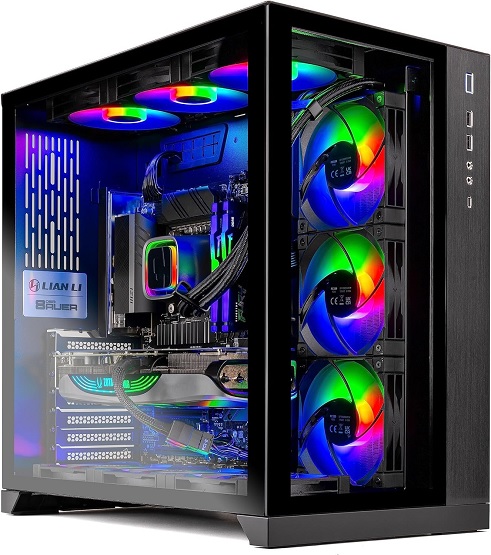Home > Desktops
Best Prebuilt PCs for Gaming/VR (2025)
Finding the Best Value Gaming Desktops Under $1000 and $2000 (US Dollars)

Last Updated: February 3, 2025
In this guide I research and list some of the best prebuilt gaming PCs on Amazon US at the time of writing, including tips at the end on how to choose a good prebuilt desktop for gaming. In PC hardware communities, prebuilt PCs are insulted more often than R2D2 was by C3PO. Makes sense though, seeing as R2 was built by a mass-production droid manufacturer (AKA a prebuilt PC company), while smug C3PO was proudly custom built by some whiz kid using spare parts. But I quite dramatically digress. Besides the fact that building your own PC is typically more cost-effective (most prebuilts are overpriced relative to buying each component individually), there are other reasons why prebuilts get a bad name. The convenience of buying a pre-assembled, 100% ready-to-go computer is tempting, but there are various pitfalls you must be aware of in order to avoid buying a dud of a droid.
For example, if it's a particularly bad prebuilt - the type that would get a deserved roasting from Steve from Gamer's Nexus - it may include an obscure branded, unreliable, low-quality ticking-timebomb of a power supply that you wouldn't want any half-decent gaming PC to have to rely over multiple years. Or, it could have poor, restricted airflow that could lead to excessive noise, high temperatures, overheating, or worse (big bada boom). But besides companies cutting corners on component quality, there are other potential downsides to buying a prebuilt. If you're interested, see building vs buying a gaming PC for more detail.
But not all prebuilt PCs are horrible piles of steaming scrap metal, and if you do your research there are options worth considering out there. Especially if you stick to the more trusted prebuilt brands. Despite the advantages of building your own PC, perhaps you don't have the patience to learn how to do so, and to spend the extra time needed to pick and choose each individual part. And that's okay. But if you do go down the prebuilt PC route, you absolutely must keep your wits about you, meaning do your research. Many, perhaps most prebuilt PCs are either way overpriced for what you get, or they are systems that cut a little too many corners in terms of component quality as mentioned, but also in features (eg low storage, limited upgrade flexibility, inadequate airflow, and so on).
 Be skeptical and keep your wits about you when shopping for a prebuilt PC as they're not always as they seem (look past flashy exteriors or clever marketing)
Be skeptical and keep your wits about you when shopping for a prebuilt PC as they're not always as they seem (look past flashy exteriors or clever marketing)If you want my opinion on some of the best value prebuilt gaming PCs out there right now, let's cut the ranting and get into my recommendations after having analyzed the current minefield of a market with its many overpriced systems, ticking time-bomb abominations, and the occasional diamond in the rough that represents good value that I can stick my neck out for and recommend. Also please note:
- Prices mentioned are in USD (US Dollars)
- At the time of writing, all models below fit into their respective price categories, but if prices change and a certain model no longer fits into its category, it's safe to assume I no longer recommend that model
Best Prebuilt Gaming PC Under $1000 (2025)
Skytech Gaming Nebula RTX 4060 (Amazon)
If you're hunting the best value prebuilt desktop under 1000 dollars, that has a capable gaming CPU and GPU and a solid set of supporting components, this Skytech computer is one of the best value picks I could find on Amazon at the time of writing. With a solid mid-range RTX 4060 graphics card, a fast modern Intel i5 processor, and a healthy 16GB of RAM, with this setup you can expect excellent performance for 1080p gaming and decent 1440p frame rates too. For older games you could even use a 4K monitor, but it depends on the game. This desktop is also more than good enough for a solid VR (Virtual Reality) experience in the latest VR titles.
 SkyTech offer some of the best value desktops, with quite decent quality parts
SkyTech offer some of the best value desktops, with quite decent quality partsSkytech have taken the prebuilt PC market by storm in the past couple of years, and they're selling like hot cakes, especially on Amazon. Popularity doesn't necessarily equate to quality though, but in this instance it is warranted in my opinion, as they currently offer some of the best value gaming desktops on the market whilst importantly not cutting too many corners to make that happen.
When they first came onto the prebuilt PC scene a few years ago, we were justifiably skeptical, as you should be with any new PC building company, but over recent years they have proven themselves as a quality company providing quality builds and solid customer support. Having kept a close critical eye on them for a while now, they genuinely seem better than most prebuilt PCs in terms of the components they use, the overall flexibility of their builds (they tend to be easily upgradeable), and the gaming performance you get for the money.
Model Number: ST-NEBULA-0819-B-AM
CPU: Intel Core i5 13400F
CPU Cooler: Intel Stock Cooler
GPU: NVidia GeForce RTX 4060 (8GB GDDR6)
RAM: 16GB DDR4 (3200MHz)
Motherboard: Intel B660
Storage: 1TB NVMe SSD
Power Supply: 600 Watt Gold
Case: Skytech Nebula Black
Case Fans: 4x RGB
OS: Windows 11 Home
WiFi: WiFi 5 (802.11ac)
Other: Included Keyboard and Mouse
Warranty: 1 Year
Honorable Mentions
Skytech Gaming Nebula RTX 3050 (Amazon)
Model: ST-NEBULA-0927-B-AM
Intel Core i5 13400F, 16GB 3200MHz DDR4, 1TB SSD, WiFi 5
CyberPowerPC Gamer Xtreme RTX 4060 (Amazon)
Model: GXiVR8060A24
Intel Core i5 13400F, 16GB DDR5, 1TB SSD, WiFi 5
Best Prebuilt Gaming PC Under $2000 (2025)
Skytech O11D RX 7800XT Gaming PC (Amazon)
With more to spend on a prebuilt desktop, this upper mid to high-end Skytech model that packs a powerful Radeon RX 7800XT (equivalent to a NVIDIA GeForce RTX 4070), along with the high-end gaming processor in the Ryzen 7 7800X3D is overall a fairly decent value purchase at its current price around $1650 USD relative to the other options I found. You also get a huge 32GB of the latest DDR5 memory, helping this setup double up as an excellent productivity workstation.

Cooling is great too, with a 360mm AiO liquid cooler to tame the fast CPU, and a total of 6 internal fans. It also comes with everything else you'd expect from a solid prebuilt PC that's ready to go out of the box, including WiFi, a fast 1TB drive, Windows 11, a good quality case and a gold-rated power supply with plenty of wattage (750 watts).
Model Number: ST-O11-1277-B-AM
CPU: AMD Ryzen 7 7800X3D (8 Core)
Cooler: 360mm AiO Liquid Cooler
GPU: AMD Radeon RX 7800XT (16GB GDDR6)
RAM: 32GB DDR5 (5600MHz)
Motherboard: AM4 (Unspecified Model)
Storage: 1TB NVMe SSD (Gen4)
Power Supply: 750 Watt 80 Plus Gold (Unspecified Model)
Case: Lian Li PC-O11 Dynamic (Black)
Case Fans: 3 x ARGB (+3 on the AiO)
OS: Windows 11 Home
WiFi: Yes (802.11AC WiFi 5)
Other: Included Keyboard and Mouse
Warranty: 1 Year
Honorable Mentions
CyberPowerPC Gamer Xtreme VR RTX 4070 Super (Amazon)
Model: GXiVR8080A38
Intel Core i9-14900KF, 32GB DDR5, 2TB NVMe SSD, WiFi 5
ASUS ROG Strix G15DS RTX 4070 (Amazon)
Model: G15DS-DH774
AMD Ryzen 7 7700X, 16GB DDR5, 1TB SSD
iBUYPOWER Slate 8 MESH RX 7800XT (Amazon)
Model: SMA7R78XT02
AMD Ryzen 7 9700X, 32GB DDR5, 1TB SSD, WiFi 5
Specs to Look for When Choosing a Prebuilt PC
If you're new to PC hardware, here are some basic things to keep in mind about choosing a good prebuilt desktop for gaming in terms of their parts-list. There are tons of specs and features that make up a computer, but these are the key things to know if you're a gamer.
Look at Graphics Card First
For gaming and VR, the most important component of the computer by far is the graphics card (also called the GPU) since it has a huge say in what performance you'll experience. So, when choosing and comparing prebuilt desktops, first look at the GPU in the specs to quickly weed out PCs that aren't worth your time. If you want to make a smart purchase, before your hunt you should have at least a basic general idea of the modern GPU hierarchy - in other words, which cards are fastest right now, which are mid-range cards, and so on. Even computers marketed as "gaming PCs" may not necessarily have a good GPU inside, and oftentimes they include considerably less powerful GPUs than they could have included for that price. Stay on your toes and compare different prebuilt PCs around your price range to get a sense of the best GPU/s you could get in a system around that budget. See the gaming GPU buyer's guide for more.
Check the CPU
The CPU also determines the gaming performance that your new system will offer you, but not anywhere near as much as the graphics card. Most prebuilt PCs with a good graphics card will have a sufficient CPU, so unless you have extra requirements other than gaming (eg very demanding non-gaming applications such as heavy video editing, or seriously heavy multitasking) then you often won't have to worry too much about which CPU is included if you're getting the graphics card that you want.
But of course, do get a basic understanding of what CPU you're getting and what sort of tier it is in terms of gaming performance. Oh and in general, you can't go wrong with either Intel or AMD these days. In the past Intel was clearly better for gaming, but in recent years AMD caught up nicely and has even overtaken Intel in certain aspects. See the gaming CPU buyer's guide for full details if interested.
16GB RAM is Ideal
For modern gaming, 8GB of RAM is the absolute minimum to shoot for, so don't buy a prebuilt PC that doesn't have at least this amount. However, 16GB of RAM is ideal, especially for VR gaming which are typically more demanding than flatscreen titles. 16GB will also make for a super fast multitasking machine. If you want to leave nothing to chance for the absolute most demanding games on the market now and over the coming few years, 32GB would be amazing but is a luxury and not a requirement. As for the speed of RAM, it doesn't matter anywhere near as much as the amount of RAM, but the ideal these days is having RAM with a speed of 3000MHz or faster.
On a cheaper PC, if the speed is only 2666MHz, don't worry about it. Last but not least, DDR5 is the latest and greatest type of memory, but it's so new that it's just not necessary for a modern gaming PC at the moment (DDR5 isn't much faster than DDR4 in today's games). Getting tried and true (and cheaper) DDR4 memory is absolutely fine, and still will be for at least a couple years to come. If you do want the absolute most cutting-edge tech though, and you're willing to pay extra for it, then and only then should you really care about choosing a prebuilt PC that has DDR5 memory.
Ensure it Has An SSD
These days there's no excuse to not get a SSD as your main storage drive (where your operating system and other key programs/games will be stored). SSD are much more affordable these days, so if a prebuilt PC doesn't include even a small 120GB-240GB one, then avoid that system at all costs. Any half decent prebuilt PC will have an SSD though. If you're downloading a bunch of modern games, they can be quite large so you'll ideally want a 1TB drive (500GB at the minimum).
That said, you can always easily add a secondary drive to any prebuilt PC by either installing it inside the case (if there's room) or by just using it externally (sitting on your desk). Lastly, if you're spending a good amount on a gaming desktop, you'll want to ensure the SSD it includes is a NVMe drive, which are faster than SATA drives. See the SSD buyer's guide for more on SSDs.
Check the Power Supply
One very common downside to buying a prebuilt PC is the fact you'll often be getting an average quality power supply (PSU) from a less than desirable brand. Do your research on the particular PSU that's included in the system, especially if you are buying a more powerful system. For example, you really don't want a cheap no-name PSU in a high-end RTX 3080 desktop for instance. You should also consider how much wattage the PSU has if you're considering a future upgrade of your GPU, to ensure you have enough headroom. See the PSU buyer's guide for full details.
Check WiFi and Bluetooth Support
Most higher-end desktops will have wireless functionality, but some cheaper prebuilt PCs may not. So, if you need WiFi, check the specs. If it doesn't have WiFi, you can always buy a WiFi card or USB adapter. Also, most prebuilts will have WiFi 5 ("AC"), but some have next-gen WiFi 6 ("AX") for use with next-gen WiFi 6 routers. If you have one of these latest WiFi 6 routers, you'll want a prebuilt with WiFi 6 in the spec sheet.
Same goes for Bluetooth functionality: the best gaming desktops will almost definitely have Bluetooth, but some cheaper computers may not, so if that's important to you then make sure to check the specs for Bluetooth to be listed somewhere.
Consider Cooling
Last but definitely not least, if the gaming desktop you're looking at is quite powerful, as in one that has a mid to high-end graphics card and a fast CPU, you want to ensure the system has good enough cooling for those particular parts. Especially if you want the system to run cool and/or quiet - some prebuilts don't have very effective cooling out of the box and can run hot or loud. To gauge how good the cooling is before buying, it's a good idea to read multiple customer (and professional if possible) reviews to get a sense, but never rely on just one review as gospel.
If you are a bit more tech savvy, you can get a sense of how well the system is cooled in various ways such as looking into the specific case used in the build (and how well that case is designed for airflow, eg does it have a front mesh design that allows for air to easily get sucked into the case, or is it closed off?). How many fans are included is another way to assess the cooling, as well as how good the air or liquid cooler is relative to the CPU used.
Related: How to Check GPU Temperatures (& Safe Ranges)
Trusted VPN
VPN software can be important in this day and age, especially if you do lots of online banking and/or use public WiFi whilst travelling. Having a VPN adds an extra layer of security to your PC or laptop when online to help protect your data, passwords, financials, etc from hackers or malicious programs. It can also let you access region-locked content (eg US Netflix from overseas). For gamers their can be even more benefits to using a VPN.
Because they're so popular these days, there are countless VPN providers, and it can be confusing to pick one. If you want my 2 cents, after a lot of research I decided on NordVPN 'cause it's one of the fastest, most reliable VPNs for both gaming and general use, with a lot of credible reviews out there backing that up. They also quite often run very solid deals.
Popular Articles (see all)
Search the Site
About the Author (2025 Update)
I'm an indie game developer currently very deep in development on my first public release, a highly-immersive VR spy shooter set in a realistic near-future releasing on Steam when it's ready. The game is partly inspired by some of my favorites of all time including Perfect Dark, MGS1 and 2, HL2, Splinter Cell, KOTOR, and Deus Ex (also movies like SW1-6, The Matrix, Bladerunner, and 5th Element).
Researching, writing, and periodically updating this site helps a little with self-funding the game as I earn a few dollars here and there from Amazon's affiliate program (if you click an Amazon link on this site and buy something, I get a tiny cut of the total sale, at no extra cost to you).
Hope the site helps save you money or frustration when building a PC, and if you want to support the countless hours gone into creating and fine-tuning the many guides and tutorials on the site, besides using my Amazon links if purchasing something, sharing an article on socials or Reddit does help and is much appreciated.

